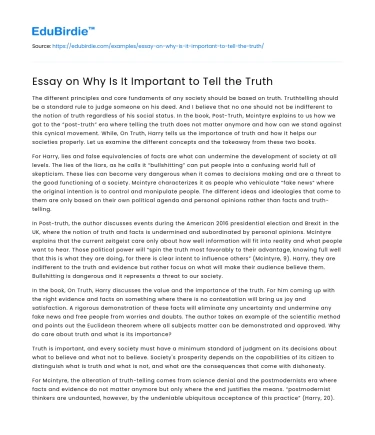The different principles and core fundaments of any society should be based on truth. Truthtelling should be a standard rule to judge someone on his deed. And I believe that no one should not be indifferent to the notion of truth regardless of his social status. In the book, Post-Truth, Mcintyre explains to us how we got to the “post-truth” era where telling the truth does not matter anymore and how can we stand against this cynical movement. While, On Truth, Harry tells us the importance of truth and how it helps our societies properly. Let us examine the different concepts and the takeaway from these two books.
For Harry, lies and false equivalencies of facts are what can undermine the development of society at all levels. The lies of the liars, as he calls it “bullshitting” can put people into a confusing world full of skepticism. These lies can become very dangerous when it comes to decisions making and are a threat to the good functioning of a society. Mcintyre characterizes it as people who vehiculate “fake news” where the original intention is to control and manipulate people. The different ideas and ideologies that come to them are only based on their own political agenda and personal opinions rather than facts and truth-telling.
Save your time!
We can take care of your essay
- Proper editing and formatting
- Free revision, title page, and bibliography
- Flexible prices and money-back guarantee
In Post-truth, the author discusses events during the American 2016 presidential election and Brexit in the UK, where the notion of truth and facts is undermined and subordinated by personal opinions. Mcintyre explains that the current zeitgeist care only about how well information will fit into reality and what people want to hear. Those political power will “spin the truth most favorably to their advantage, knowing full well that this is what they are doing, for there is clear intent to influence others” (Mcintyre, 9). Harry, they are indifferent to the truth and evidence but rather focus on what will make their audience believe them. Bullshitting is dangerous and it represents a threat to our society.
In the book, On Truth, Harry discusses the value and the importance of the truth. For him coming up with the right evidence and facts on something where there is no contestation will bring us joy and satisfaction. A rigorous demonstration of these facts will eliminate any uncertainty and undermine any fake news and free people from worries and doubts. The author takes an example of the scientific method and points out the Euclidean theorem where all subjects matter can be demonstrated and approved. Why do care about truth and what is its importance?
Truth is important, and every society must have a minimum standard of judgment on its decisions about what to believe and what not to believe. Society's prosperity depends on the capabilities of its citizen to distinguish what is truth and what is not, and what are the consequences that come with dishonesty.
For Mcintyre, the alteration of truth-telling comes from science denial and the postmodernists era where facts and evidence do not matter anymore but only where the end justifies the means. “postmodernist thinkers are undaunted, however, by the undeniable ubiquitous acceptance of this practice” (Harry, 20). Even though our decisions are marked by events and personal opinions and circumstances we should, in our clear mind deliberately seek the truth and discard any false equivalencies. For Harry to assess what is truth and what is false we must have an “evaluative or normative judgment” (Harry, 30).
For Harry, truth “possesses values and have practical utility because they consist of, and because they, therefore, can provide us with, accurate accounts of the properties of the real objects and events with which we must deal when we act” (Harry,51). Without the truth, we live in a world with non-fundamental reasons to believe or trust someone. But we are guided by those who try to manipulate us for their own gains and interest. Our beliefs and perceptions will be disoriented to the point where we live with ignorance. “we can therefore do no better than to spin out uninformed guesses and, shakily, to hope for the best” (Harry, 60). Consequently, the truth will help us construct a productive and prospective social life.






 Stuck on your essay?
Stuck on your essay?

